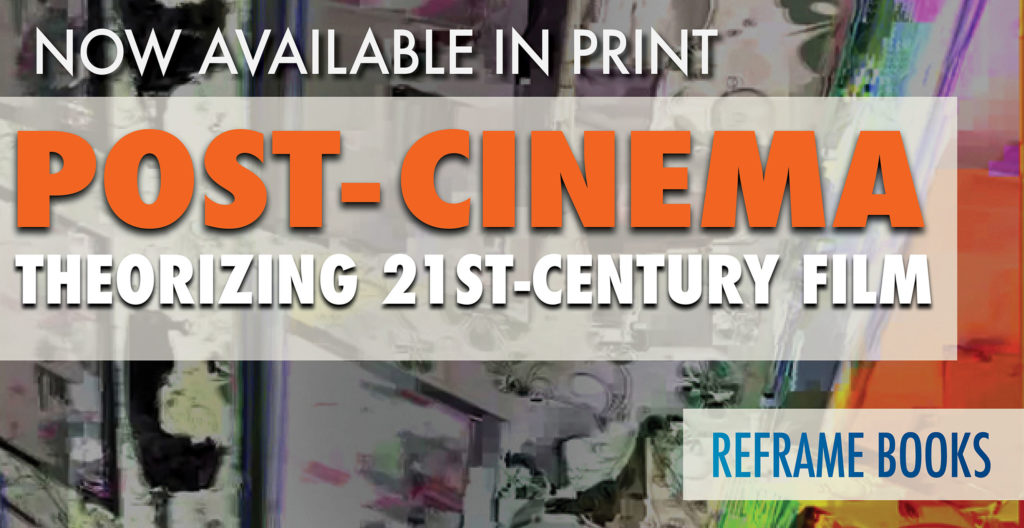
REFRAME is thrilled to announce that the book Post-Cinema: Theorizing 21st Century Film (Eds. Shane Denson and Julia Leyda, published by REFRAME Books) is now available in print! At 1,000+ pages, we have split the book into four volumes and are selling each volume at cost-price. This is in accordance with the original Creative Commons license (CC BY-NC-ND) and the purchase price covers only the printing.
Volumes can be ordered from Lulu.com – get your copy here:
- Volume 1 ISBN 9781739582029
- Volume 2 ISBN: 9781739582036
- Volume 3 ISBN: 9781739582043
- Volume 4 ISBN: 9781739582050
Of course, the book is still available to read for free online – read it here
https://reframe.sussex.ac.uk/post-cinema/ or download the PDF here: Download PDF 13mb
The book asks: If cinema and television, as the dominant media of the 20th century, shaped and reflected our cultural sensibilities, how do new digital media in the 21st century help to shape and reflect new forms of sensibility? In this collection, editors Shane Denson and Julia Leyda have gathered a range of essays that approach this question by way of a critical engagement with the notion of “post-cinema.” The contributions take as their critical starting-points concepts such as David Bordwell’s “intensified continuity” or Steven Shaviro’s “post-cinematic affect” and “post-continuity.” They expand and build upon the ideas of these and a range of other thinkers, with the goal of coming to terms with an apparently new media ecology that requires us to search for a fresh critical vocabulary. By examining the experiential, technological, political, historical, and ecological aspects of the transition from a cinematic to a post-cinematic media regime, the chapters explore key questions in breaking this new ground, seeking and articulating both continuities and disjunctures between film’s first and second centuries. Questions of aesthetics and form overlap with investigations of changing technological and industrial practices, contemporary formations of capital, and cultural concerns such as identity and social inequalities. The impact of digitization on taken-for-granted conventions is also in play: intermediality, new forms of distribution both licit and illicit, academic and critical reliance on genres and discrete media formats – all of these come under scrutiny as paradigms shift in the post-cinematic era.
About the Editors:
Shane Denson is a DAAD postdoctoral fellow at Duke University, where he is affiliated with the Program in Literature, the Department of Art, Art History & Visual Studies, and the Information Science + Studies Program. He is also an assistant professor at the Leibniz Universität Hannover and a member of the interdisciplinary research unit “Popular Seriality—Aesthetics and Practice,” based at the Freie Universität Berlin. From September 2016, he will be Assistant Professor of Art & Art History (teaching in the Film & Media Program) at Stanford University. He is the author of Postnaturalism: Frankenstein, Film, and the Anthropotechnical Interface (Transcript-Verlag / Columbia UP, 2014) and co-editor of several collections: Transnational Perspectives on Graphic Narratives (Bloomsbury, 2013), Digital Seriality (special issue of Eludamos: Journal for Computer Game Culture, 2014), as well as the present volume.
Julia Leyda is Senior Fellow in the Institute for Advanced Sustainability Studies, Potsdam, as well as Fellow with the DFG Research Unit “Popular Seriality–Aesthetics and Practice” and Senior Research Fellow in the Graduate School for North American Studies, both at the John F. Kennedy Institute, Freie Universität Berlin. In August 2016, she will take up an Associate Professorship of Film Studies in the Department of Art and Media Studies at the Norwegian University of Science and Technology in Trondheim. She is editor or co-editor of Todd Haynes: Interviews (UP of Mississippi, 2014), Extreme Weather and Global Media (with Diane Negra, Routledge, 2015), and The Aesthetics and Affects of Cuteness (with Joshua Paul Dale, Joyce Goggin, Anthony P. McIntyre, and Diane Negra, Routledge 2017). She is author of American Mobilities: Class, Race, and Gender in US Culture (Transcript, 2016), and is working on two new books: Home Economics: The Financialization of Domestic Space in 21st-Century US Screen Culture and Cultural Affordances of Cli-Fi: 21st-Century Scenarios of Climate Futures.
A special thanks to Editor Shane Denson for their work in making the print version happen!
